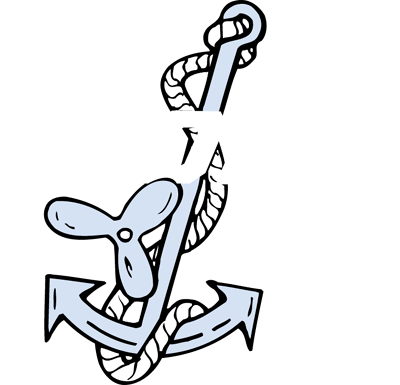Review Of Vice Commandant Appeal Decision Of Interest
USCG v. Charles Eugene Walker
(App. Dec. 2677) (March 20, 2008)
The Respondent in this case was charged by the United States Coast Guard with a single specification of misconduct when, following direction by his employer to take a "Reasonable Suspicion DOT alcohol test in accordance with 46 CFR 16 (sic)" he tested positive for alcohol. The Respondent failed to answer the complaint and the ALJ granted the Coast Guard's request for a default order. Under 33 CFR 20.310 (c), the allegations in the complaint were therefore considered admitted. The Administrative Law Judge ALJ suspended the Respondent's credential for 15 days. Without ever participating in any aspect of the ALJ proceedings, the Respondent then appealed the suspension to the Vice Commandant.
The basis of the Respondent's appeal was that the record of the ALJ proceeding on the whole failed to contain substantial evidence to show that the Respondent was "acting under authority of his merchant marine credential". 46 USC s. 7703 requires that in order to establish jurisdiction in a misconduct case, the alleged conduct must be proven to have occurred while the mariner was "acting under the authority " of his credential. The regulations found at 46 CFR s. 5.57 (a) define "acting under the authority" as occurring when the holding of the credential is either required by law or regulation, or required by an employer as a condition of employment.
The Vice Commandant noted that even though this was an appeal from a default in which all allegations were deemed admitted, the Respondent had raised an issue of jurisdiction, and the burden of establishing jurisdiction nonetheless remained with the Coast Guard. Turning then to the Coast Guard's complaint, which because of the respondent's default was the only thing on the record, the Vice Commandant observed that it was completely silent on whether the Respondent was "acting under the authority" of his credential. Absent any such allegation which could have been deemed admitted, the Vice Commandant found that the Coast Guard had failed to meet its burden of establishing jurisdiction, and the Coast Guard's complaint was dismissed.
Comment And Assessment
This is an extremely interesting and instructive case for several reasons. First, of course, it reminds us that in examining a Coast Guard complaint, we should always ensure that the Coast Guard properly alleges all of the essential elements of its cause of action. In this case, the Coast Guard did not. Secondly, it points out the fact that whether alleging a particular set of facts will be jurisdictional or not will often, as in this case, depend upon the wording of a particular statute or regulation. The statutory and regulatory basis for the Coast Guard's complaint must therefore always be closely examined.
Finally, and most interestingly, this case presents the fascinating, if not counter-intuitive possibility that, on these facts at least, itwas a better defense strategy to take a default on the complaint in the ALJ proceedings, than it would have been to answer and defend. This cannot be stated for certain because the Vice Commandant does not tell us, as apparently he cannot, whether the mariner in question actually WAS operating under authority of his credential at the time of his employer-ordered test. But assuming for the moment that he was, consider this: Had the mariner in fact answered the complaint and defended at the ALJ level, and had he raised the jurisdictional issues in his answer as he ought to have done, the ALJ would no doubt have cleaned the Coast Guard's case up for it, either by permitting it to amend its complaint to properly allege jurisdiction, or by doing it himself sua sponte, as Coast Guard ALJs are not infrequently known to do. Either way, the jurisdictional problem for the Coast Guard would undoubtedly have been cured prior to appeal…had it been raised below at all. But because the ALJ proceedings below went into default, the faulty jurisdictional allegations in the Coast Guard's complaint were never cured, and when the issue got to the Vice Commandant it was then too late. Alternatively, the same result could in theory have also been achieved had the Respondent answered and defended before the ALJ, but not raised the jurisdictional issue at all until the appeal. That would have of course been riskier, but there is at least the traditional argument that jurisdiction goes to the power of the tribunal to hear the matter at all, and therefore it is always in order for an appellate authority to look at jurisdiction whether it was properly raised below or not. The other unknown presented by this case is what role was played in the Vice Commandant's thinking by the fact that the Respondent was apparently unrepresented at all until the appeal. Would the Vice Commandant have been as ready to find against the Coast Guard had the Respondent been represented, and especially if the default been part of a concerted and calculated defense strategy?
Whether the default strategy was intentional or not, it can be observed from one viewpoint at least that the strategy itself was, when judged by the result, brilliant: it made a skillful end-run around, and in so doing neutralized completely, one of the Coast Guard's biggest advantages - the proactive role of the ALJ, who can always be relied upon to faithfully patch up all the leaks in the Coast Guard's case before sending off onappeal. Because of the inherent risks which a calculated employment of this strategy would no doubt raise, we of course stop short of recommending this as a defense strategy; but the points raised by this case are certainly worthy of note, and it is at least a case worth keeping on file.
